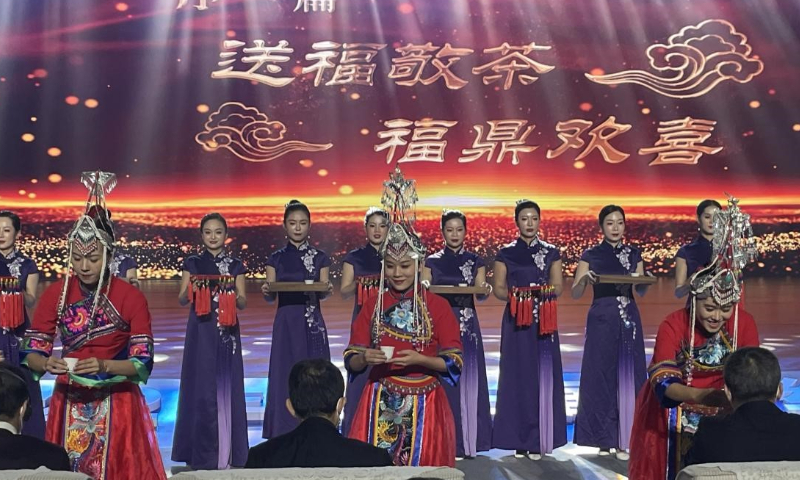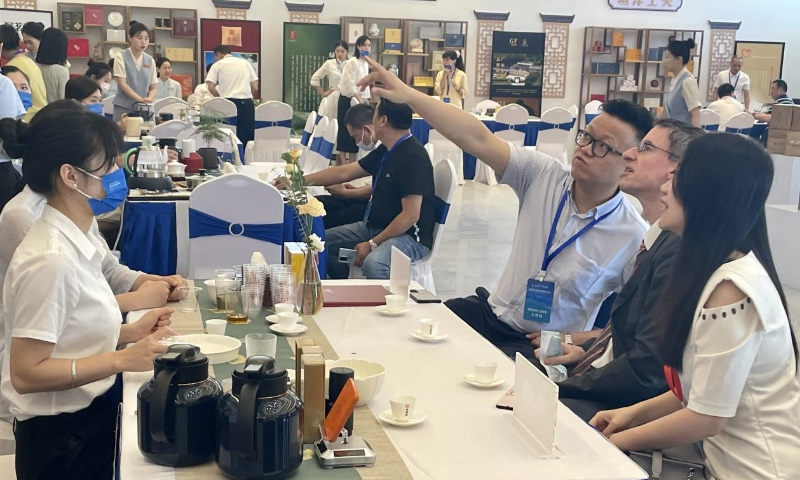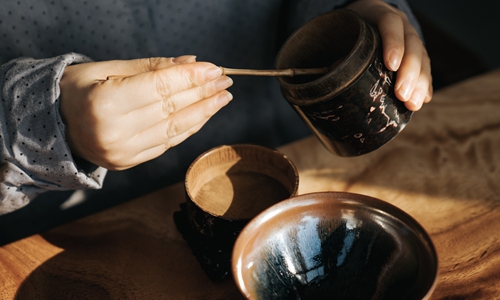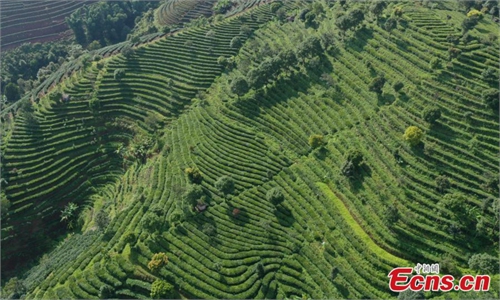Maritime Silk Road International Tea Culture Forum held in Fujian to boost exchanges and share highlights of China's rural revitalization

At the forum, attendants wearing traditional costumes of the local She ethnic minority, showed the guests the art of tea. Photo: Lin Xiaoyi/GT
"According to tradition 'it is better to go without meat for 100 days than without tea for one day.' China is the home of the tea culture, which is visible in every part of the daily life of Chinese people. Here, in Fujian Province, we see vivid examples of poverty alleviation through the development of the tea industry and Sri Lanka would like to do the same," Sri Lanka's Ambassador to China, Palitha Kohona, told the Global Times on Wednesday during the Third Maritime Silk Road International Tea Culture Forum 2022.
Launched in Fuding, East China's Fujian Province, from June 27 to 30, the forum aims to promote the tea industry and cultural exchanges between China and foreign countries, to further boost the construction of the China-proposed Belt and Road Initiative (BRI) and share China's experience on rural revitalization.
The forum, which was broadcasted live from the main venue in Fuding and in cohost city, Tokyo, attracted more than 250 Chinese and foreign tea experts and scholars, diplomatic envoys and foreign visitors.

Foreign visitors learn about tea and tea culture at the forum. Photo: Lin Xiaoyi/GT
Chinese tea: the flavor that changed the world
Kijima Yoshiko, information and culture minister of the Japanese Embassy in China, noted at the forum that the Japanese tea drinking custom can be traced back to the Tang Dynasty (618-907) in China and was introduced to Japan through the diplomatic envoys.
"300 years ago, Yinyuan Longqi, master of Linji Chan Buddhism from China, traveled to Japan to spread Buddhism and brought the Chinese tea ceremony to the country. After improvement, today we have the fried tea in Japan. Currently, during the difficult times of the rampage of COVID-19, exchanges based on the tea culture and its related industry can be a window for us to know the world and expand our view," she said.
Growing tea in plantations since ancient times, China is the origin of the tea tree and has a long history of tea production and processing. As early as 2,000 years ago, tea was introduced from China to Europe through Turkey as an important commodity of the ancient Silk Road.
The impact of Chinese tea on the world now has long exceeded its significance as a general agricultural product. The culture tea nurtures has become a national brand that showcases China's image and expresses China's unique cultural charm.
Experts attending the forum said that silk, porcelain, tea, horses and spices were major trade products that circulated along the ancient Silk Road. During several historical periods when China's overseas trade flourished, the Silk Road was to some extent regarded by the world as the "Tea Road."
At present, China's tea market is still prosperous. Cultural and commercial tea exchanges between China and other countries are gradually increasing.
"The original Sri Lankan tea plants probably came from Fujian and we developed quickly as a black tea producing country. Due to our climate, the mountainous slopes, the unique soil and the hand plucking, our tea has evolved with its own characteristics: its own color, flavor and taste," Kohona said.
The ambassador noted that in 2021, China imported 15.24 million kilograms of Ceylon tea from Sri Lanka.
"The Sri Lankan tea industry is critical to the prosperity of the country. Our economy was rising quickly, with a growing and comfortable middle class, until the economic crisis interrupted our progress. I believe that with China's continuous support, Sri Lanka will overcome the current difficulties, ease the debt burden and realize sustainable development," Kohona stressed.
The grip of rural revitalization
During the forum, diplomatic envoys and foreign guests also visited Chixi village in Fuding, which is known as "China's first village of poverty alleviation," where they learned about its story to get rid of poverty through the scientific development of the tea industry.
Thirty years ago, Chixi village was synonymous with poverty, with villagers living in crumbling thatched huts on the mountain. Thanks to the help of the local authorities over the past decades, Chixi village has improved the living conditions of its residents through the poverty alleviation relocation project and has developed a number of projects on environmental agriculture and tourism to encourage and guide locals to start their own businesses in the village.
"The tea industry is our leading industry. Almost every household in our village grows tea," Du Jiazhu, former Secretary of the Xiaogang Village Committee of the CPC, told the Global Times, noting that in recent years, the local government has reached out to large tea enterprises to provide capital, technology and human resources to help local tea farmers to comprehensively enhance the level of agricultural industrialization and create a sustainable and profitable mechanism for the tea industry.
In 2021, the per capita disposable income of farmers in Chixi village exceeded 32,200 yuan ($4,806), with revenue from the tea industry exceeding 40 percent.
The experience of fighting poverty in Chixi village also sparked Kohona's attention.
"Getting rid of poverty is a remarkable and unique achievement China has done under the leadership of the Communist Party of China. No other country has eliminated extreme poverty," Kohona said, noting that he intended to learn from China's development path of using the tea industry to drive farmers out of poverty.
"In Sri Lanka, tea is grown in rural, especially mountainous areas. Women are the key component of the workforce there. We also would like to eliminate rural poverty and, to do that, improving the tea industry would be key. We will have to improve the tea industry to help those rural families achieve moderate prosperity as China has done," he said.



